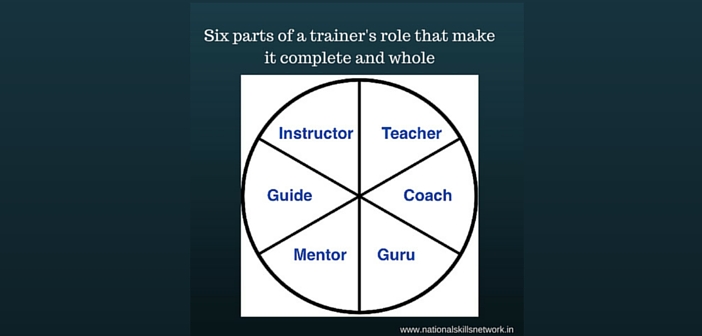The path to effective skill development and on-the-job training (OJT) and work-integrated learning (WIL) is carved out by three key stakeholders: the learner / trainee, the trainer and the employer / professional practice. All three of them need to be equally committed to successful skilling that results in desirable outcomes and business impact. Nevertheless, it is the trainer who plays a critical role in designing, delivering and managing training and this has a direct impact on the functional and aspirational value of skill development.
 Often trainers get caught in the execution of training and sometimes they are also responsible for smooth implementation in terms of logistics and infrastructure. What gets left out is the holistic picture of training that includes the multi-faceted role they play at various points in training life cycle. Let’s look at the six parts that get focused during different phases of training, however overlapping they may be. The points are illustrated with an example from training banking employees in the use of new software applications for different job roles.
Often trainers get caught in the execution of training and sometimes they are also responsible for smooth implementation in terms of logistics and infrastructure. What gets left out is the holistic picture of training that includes the multi-faceted role they play at various points in training life cycle. Let’s look at the six parts that get focused during different phases of training, however overlapping they may be. The points are illustrated with an example from training banking employees in the use of new software applications for different job roles.
Teacher: Every trainer performs the role of a teacher while imparting knowledge, mostly theoretical, in the form of concepts, answering ‘what’ and ‘why’. This seems so much like the teacher in a school or college who operates in the formal education system. For instance, in any technical training, conceptual knowledge is simplified and shared by lecturing and by making presentations so that students grasp and understand.
Example 1: Teaching the concepts about how a motor bike works, what are its parts and explaining their function
Example 2: Teaching new concepts in banking while imparting training in the banking software systems and applications.
Instructor: This is like a synonym for a trainer, but it limits the scope of training by narrowing it down to practical skills or the ‘how’ aspects of knowledge application through hands-on training. Mostly, on-the-job trainers in any industry focus on developing manual skills like operating machinery, industrial equipment, software applications and electronic gadgets.
Example 1: Showing how the parts work, giving a demo and helping the trainees learn hands-on
Example 2: Demonstrating how to use the application with various tasks and providing hands-on experience of a banking application.
Guide: When an on-the-job trainer is assigned to a project trainee he or she facilitates the completion of the project by offering practical advice and taking them through different stages. As a guide, the trainer connects closely with the industry and bridges the gap between knowledge and its practical value.
Example 1: Helping the trainees with individual attention, guiding them through a project on specific topic
Example 2: Guiding a project trainee who is conducting a study of the effectiveness of mobile apps in banking.
Coach: In certain situations, the trainer performs the role of a coach by building confidence and boosting the morale of a trainee in practical situations while using specific skills. This helps in reducing performance anxiety and prepares them for long-term employability as well. It is not a one-off interaction but a series, calling for a continued association with the learner.
Example: In a certain section of the training program, the trainer spends time in preparing the learners to appreciate new knowledge and skills they would be acquiring while learning about new ways of customer service in banking.
Mentor: By observing and assessing the performance, trainers take up mentoring and counselling on an individual level. They interact with learners personally and establish ways to self-improvement. This can also be used for remedial training that needs special attention in improving the skills and delivering flawless performance.
Example: After spending considerable time with the trainees, the trainer identifies some learners who need assistance by way of mentoring. This could be one-on-one counselling or focused guidance in accomplishing the tasks and developing interest in the subject.
Guru: Enlightened trainers ignite the passion and inspire learners to think beyond immediate relevance of on-the-job training. This can propel the learners to go deeper into the subject through continuous and self-learning and come up with innovative solutions.
Example: For the trainees to get really interested in the subject matter the trainer arouses curiosity to explore the subject further. The trainer is looked upon as a highly knowledgeable domain expert who can inspire the trainees.
Successful training depends on how we train the trainers to play these parts with ease and the value they bring through each of them. How about observing your own training sessions to know how many of these are implied in your training or may be even more! Do share your observations.
Thanks Kavitha Chennupati for the inputs while refreshing our training and e-learning days!






This is what trainer should follow. Every one should read and adopt it & practice it..